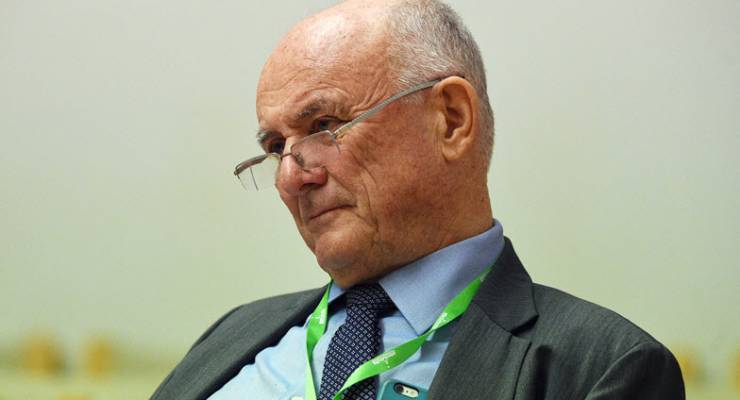
Migrant Workers’ Taskforce chair Allan Fels
And you thought Australian workers had it tough. Of the 50 prosecutions undertaken by workplace regulator the Fair Work Ombudsman in 2015-2016, 38 involved migrant workers on a visa — a majority also found in the cases reported on the Ombudsman’s website for 2016-17. However, as Crikey has previously reported, most migrants who are exploited at work never report it. The regulation of work visas in Australia practically guarantees that.
“The cases pursued by FWO are the tip of iceberg,” Monash Uni associate professor of criminology Marie Segrave told Crikey.
The major barrier preventing exploited migrant workers coming forward is the co-ordination (or lack thereof) between the regulators that deal with employment and those that deal with migration. A 457 visa holder might not risk reporting unsafe or underpaid work because if they are fired, they must find alternative employment and sponsorship within 28 days or risk deportation. Or a student visa holder might be reluctant to report it if they’ve been required to work more hours than their visa allows. There is no automatic protection from deportation for workers.
“The government needs to provide migrant workers with more resources to access justice and to amend the provisions in the Migration Act, which deter migrant workers from coming forward with a complaint about their employer,” associate professor in law at the University of Adelaide Joanna Howe told Crikey. “The government also needs to dilute the power of employers under the migration system so that migrant workers are less beholden to their employer.”
There is currently an agreement between the Fair Work Ombudsman and the Department of Immigration and Border Protection regarding these situations. It stipulates that if you hold a temporary visa with work rights and have not complied with your visa conditions due to workplace exploitation, DIBP will “generally” not cancel your visa or detain or deport you as long as you have “sought advice or assistance from the FWO and you are assisting them with their inquiries, not complied with the work-related conditions only and there is no other basis for visa cancellation committed to abiding by visa conditions in the future”.
This agreement has no enforcement mechanism, nor is it overseen by anyone. It was decided at the meeting of the Migrant Workers’ Taskforce on January 25 this year. The MWT, headed by Professor Allan Fels, was set up late last year to propose “improvements in law, law enforcement and investigation, and other practical measures to more quickly identify and rectify any cases of migrant worker exploitation”.
Segrave says she has a number of concerns about this, arguing there should be a “firewall” between Fair Work and DIBP, similar to that in place between the equivalent agencies in the US, to “ensure that working conditions are recognised as a separate issue to migration issues”.
“The overlap between the two is inherently problematic, not least because it tends to result in some workers always being exploitable because their experience matters less than their migration status,” she said.
“There are also a number of concerns around the proposed protections for temporary migrants who breach their work conditions — for example, a student who breaches the 40-hour fortnight work condition — that the Migrant Workers’ Taskforce have announced. Rather than offering an amnesty to these workers if they come forward regarding conditions of exploitation, there is a commitment from DIBP to not cancel their visa as long as ‘they commit to abiding by visa conditions in the future‘ and there is no other reason for cancellation.”
Segrave, whose primary area of study is the experience of undocumented workers in Australia, says a person’s visa status should not affect their ability to access justice. She says there should be amnesty for people who breach visa conditions or don’t have a correct visa if they are being exploited in the worlplace.
“I’ve spoke to many, many undocumented workers who were being exploited, some of whom had been here 10 years, some a few months,” she said. “and they all had one thing in common — they said they knew there was nothing they could do.”








This is the govt to which Senator Cash belongs. She informed us last week that there would be investigations when employers did not keep PaTH internees on at the end of their training period. They write regulations but don’t provide the resources for them to be implemented. I remember in Fiji in 1993 the Mara govt passed new laws establishing a consumer protection agency. In an effort to make contact with it, I approached a lawyer I knew well in the A-G’s dept. He advised that it didn’t exist. I argued that it had been established by law. He replied that indeed it had been established by law but there was no office, no budget and no personnel. However the govt could still say it had established such an office. The same principle applies to regulatory authorities in Australia.
Surely the Liberal Party believes that the ruling class (themselves) can only exist if supported by a class of low paid serfs.
This belief is underpinned by the belief that poverty is a moral issue. As Hockey said: if you want to buy a house, get a good job!
“If they didn’t want to get exploited they shouldn’t have been born migrants”?
One need only pick ones parents more carefully.
Simples.